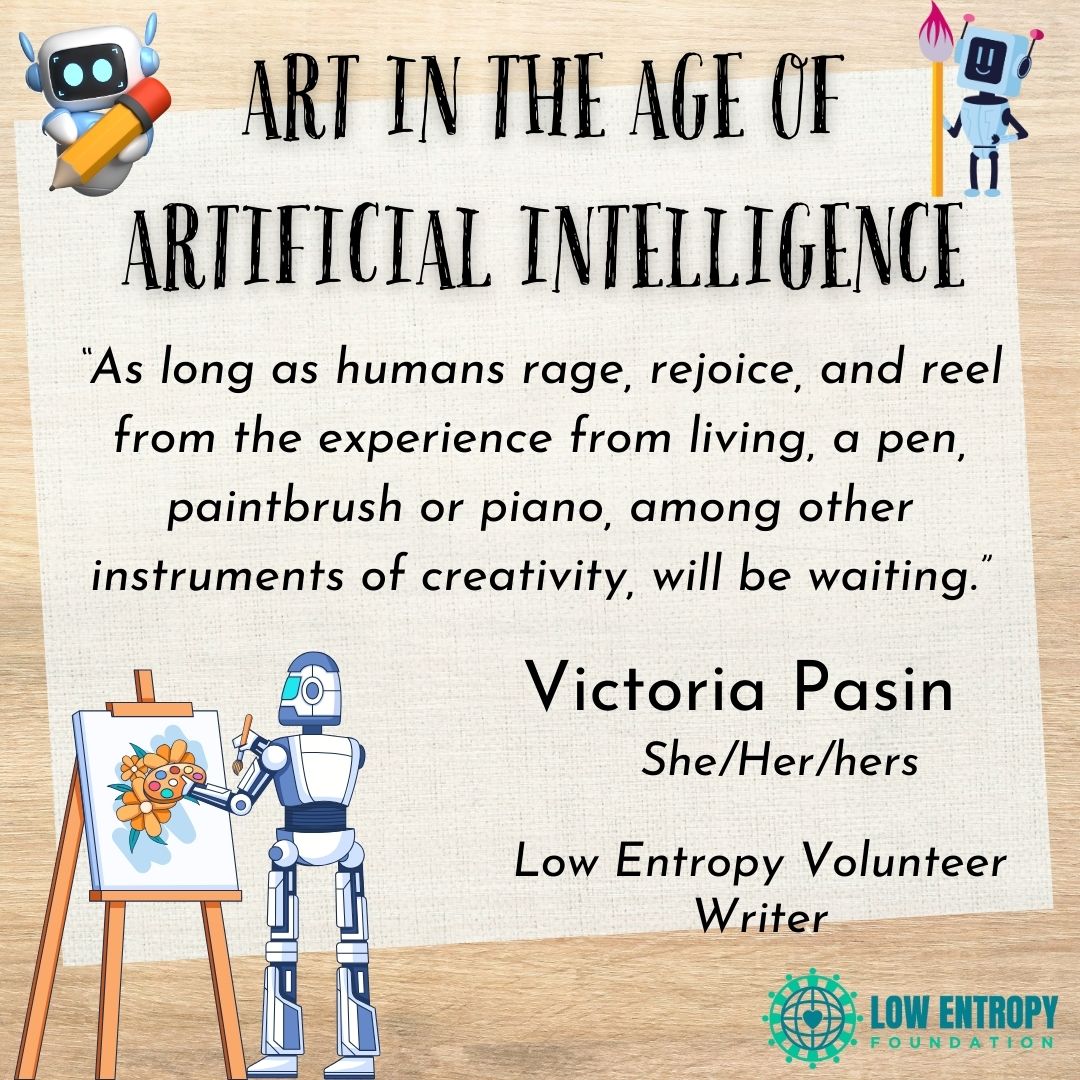Victoria Pasin, Low Entropy Volunteer Writer
As a child, I always dreamed of being a writer. I desperately wished to be the architect of a universe as intricate and enrapturing as the ones I so loved to devour in the forms of film and novels. However, with the right commands, a whole novel—that is, years of work—can be produced by the right chatbot in mere minutes. Does this mean that the creation of art is obsolete?
A few summers ago, I decided to make this dream of being a real author reality. I participated in a challenge to write a novel within the month of July. By the end of the month, I had written 30,000 words of a fantasy adventure. The heroine was a young aristocrat, dealing with the crumbling of a monarchy and growing need for change in her world. At the end of July, I felt so accomplished. At the time, I was sure about pursuing writing beyond high school.
Later that year, Chat GPT launched. I realized just how easily my work could be completed. Hours of creative struggle, effortlessly replicated. I found myself constantly grappling with this question of being obsolete.
This led me to wonder: why is art appreciated in the first place? In school, it is mandatory to study the humanities. One is obligated to learn poetry and read Shakespeare, among other classic authors. In society, artists are revered. Their pure talent serves as their legacy. Entire buildings, such as theatres, galleries and libraries, are designed just to display their work. Paparazzi chase them relentlessly. What makes them so special?
Raw human emotion. Feelings. Deceivingly simple, yet absurdly complex. That is what sets artists apart. From Van Gogh to Van Halen, all artists infuse their work with a piece of their soul. In school, we analyse famous pieces for an artist’s theme and message. Art is created to say something, to express.
This funneling of both joy and pain into ecstatic beauty cannot be replaced. As long as humans rage, rejoice and reel from the experience of living, a pen, paintbrush or piano, among other instruments of creativity, will be waiting. Of course, art is more than just a coping mechanism, and it is certainly not to be likened to one replaying sitcom episodes for comfort. However, we as a society seek out art as we seek to be understood. Artists satisfy this self-important craving.
Sure, artificial intelligence may be able to perform the technical aspects of creating a piece of art. Major companies producing commercialized products that need to sell already employ it to streamline the production process. However, this can be a decision dictated by economics, rather than by vision.
Perhaps the medium in which art is produced will change, but I refuse to believe that there will no longer be creatives within this world. It’s depressing. Art has changed before, from somber religious tones to vivid abstract works. Throughout centuries, the mediums used have continuously evolved.
There will never be a time in which voices need not be heard. It is tiring to claim that we are currently living in unprecedented times, but we are. The times are never particularly precedented, and it is a fallacy to assume that the past was any simpler simply because technology has evolved. However, art has been used, both now and in the past, as a means of protest, comfort, and as a symbol of social change. This is probably best observed in Canada through Indigenous art used in monuments to Truth and Reconciliation across the country, and in Indigenous poetry, novels and short stories incorporated into the high school curriculum.
Perhaps this seems optimistic from a purely financial perspective. After all, artists need to be paid, whereas a robot does not—at least, not a living wage. However, that doesn’t make art inherently unprofitable. The “starving artist” stereotype is not new. Ironically, the most revered artists of Hollywood fame are among some of the richest men and women in the world.
Personally, I continued my manuscript. In the years since, I have scrapped the original story, but I refuse to stop writing. To be obsolete is a choice, and a ridiculous one at that. To me, there will never not be something romantic about creating a universe. I will never not be the child with the overactive imagination.
—
Leave your thoughts for Victoria in the comments below. You can also follow us on Facebook, Instagram, TikTok, LinkedIn and YouTube to stay up-to-date with Low Entropy news!
—

